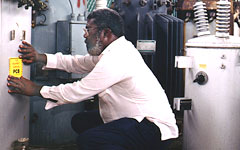Polychlorinated Biphenyls (PCBs)
Polychlorinated biphenyls (PCBs) are manufactured organic chemicals that are no longer produced in the United States, but are still in the environment and can cause health problems. PCBs do not easily break down and may remain in the air, water and soil for long periods of time.
Products made before 1977 that may contain PCBs include old fluorescent lighting fixtures and electrical devices containing PCB capacitors, and old microscope and hydraulic oils. PCBs also are common contaminants in fish.
If you are concerned about health problems associated with exposure to PCBs during your military service, talk to your health care provider or contact your local VA Environmental Health Coordinator to help you get more information from a health care provider.

Photo: U.S. Army Corps of Engineers
Exposure to PCBs
Veterans at risk for PCB exposure during military service are those who, before 1977, worked on repair and maintenance of PCB transformers, capacitors, and conduits.
Other ways of exposure to PCBs include eating contaminated food (a major source is fish caught in contaminated lakes or rivers), breathing air near hazardous waste sites, and drinking contaminated water.
Health problems associated with exposure to PCBs
The most common health problems for people exposed to large amounts of PCBs are skin conditions such as acne and rashes. Studies in exposed workers have shown changes in blood and urine that may indicate liver damage.
Learn more about PCBs and health effects from the Agency for Toxic Substances and Disease Registry.
Health concerns?
If you are concerned about health problems associated with exposure to PCBs during your military service, talk to your health care provider or contact your local VA Environmental Health Coordinator to help you get more information from a health care provider.
VA offers a variety of health care benefits to eligible Veterans. Not enrolled in the VA health care system? Find out if you qualify for VA health care.
Compensation benefits for health problems
Veterans may file a claim for disability compensation for health problems they believe are related to exposure to PCBs during military service. VA decides these claims on a case-by-case basis. File a claim online.
Learn more about VA benefits.
Polychlorinated Biphenyls
Veterans may have been exposed to PCBs during military service in general job duties. Products made before 1977 that may contain PCBs include old fluorescent lighting fixtures and electrical devices containing PCB capacitors, and old microscope and hydraulic oils.
Veterans at risk for PCB exposure during military service are those who, before 1977, worked on repair and maintenance of PCB transformers, capacitors, and conduits. Other ways of being exposed to PCBs include eating contaminated food (a major source is fish caught in contaminated lakes or rivers), breathing air near hazardous waste sites or industrial plants, and drinking contaminated water.
inhalation, dermal, ingestion
The most common health problems for people exposed to large amounts of PCBs are skin conditions such as acne and rashes.
Studies in exposed workers h have shown changes in blood and urine that may indicate liver damage, reproductive issues, and thyroid dysfunction may also be linked to PCBs.
PCBs are classified as Group 1 carcinogens, as consistent evidence has shown an increased risk of melanoma with exposure.
- PCBs webpage
- https://www.publichealth.va.gov/exposures/pcb/index.asp
- ATSDR - PCB FAQs
- https://www.atsdr.cdc.gov/toxfaqs/tfacts17.pdf
Get a Registry Evaluation
- VA Environmental Health Coordinator
- https://www.publichealth.va.gov/exposures/coordinators.asp
Contact your local https://www.publichealth.va.gov/exposures/coordinators.asp or VA Primary Care Team about getting a registry evaluation.
WRIISC Link
- War Related Illness and Injury Study Center (WRIISC)
- https://www.warrelatedillness.va.gov/WARRELATEDILLNESS/referral/index.asp
For evaluation for difficult-to-diagnose conditions, contact your local https://www.warrelatedillness.va.gov/WARRELATEDILLNESS/referral/index.asp.
/
Airborne Hazards and Open Burn Pit Registry
- https://veteran.mobilehealth.va.gov/AHBurnPitRegistry/
Airborne Hazards and Open Burn Pit Registry: VA's Office of Public Health has established a registry for individuals concerned about exposure to airborne hazards during recent deployments. To be eligible, you must be a Veteran or Servicemember who deployed to contingency operations in Southwest Asia at any time on or after August 2, 1990 (as defined in 38 CFR 3.317(e)(2)), or Afghanistan or Djibouti on or after September 11, 2001. These regions include the following countries, bodies of water, and the airspace above these locations:
- Iraq
- Afghanistan
- Kuwait
- Saudi Arabia
- Bahrain
- Djibouti
- Gulf of Aden
- Gulf of Oman
- Oman
- Qatar
- United Arab Emirates (UAE)
- Waters of the Persian Gulf, Arzabian Sea, and Red Sea
The registry consists of a web-based self-assessment to be completed by the eligible individual, which can be found at: http://www.publichealth.va.gov/exposures/burnpits/action-plan.asp. Participants may also schedule an optional in-person clinical evaluation by a VA provider. Active Duty Servicemembers who would like a similar voluntary medical evaluation may contact your local military hospital or clinic and state that you would like an appointment specifically to address health concerns related to the Airborne Hazards and Open Burn Pit Registry exposures. Please note a medical evaluation is NOT required to be in the registry.
- For more information, visit: https://veteran.mobilehealth.va.gov/AHBurnPitRegistry/
1990 2100 Gulf War, Operation Enduring Freedom (OEF) / Operation Freedom's Sentinel (OFS) Southwest Asia, South-Central Asia, Africa





















